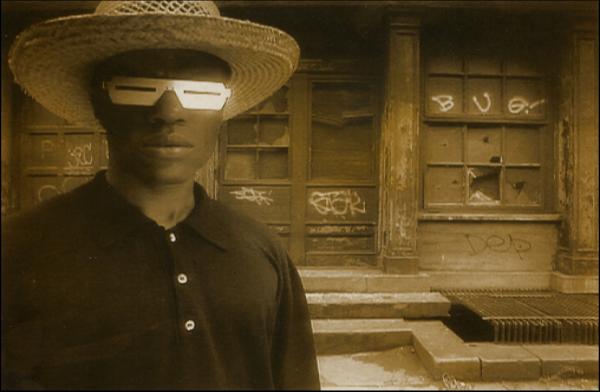Monday, October 14, 2013
Afrofuturism: speculative fictions and stories of the future
8:30pm

The Last Angel of History – John Akomfrah & The Black Audio Film Collective – GB, 1995, courtesy de l’artiste
In the presence of Kantuta Quiros (curator)
John Akomfrah & The Black Audio Film Collective – The Last Angel of History (GB, 1995, 45min, VOSTF)
They say that History repeats itself.
But History is only his story
You haven’t heard my story yet
My story is different from his story
My story is not part of History
Because History repeats itself
but my story is endless
And never repeat itself (…)
I’m more part of the Mystery
Wich is my story
(Sun Ra)
“Prototheorized as early as the 1950s-70s by musicians such as Sun Ra and George Clinton, and since the 1990s by theorists (Kodwo Eshun, Greg Tate, Mark Dery) and science-fiction writers (Samuel R. Delaney, Octavia Butler), Afrofuturism has been revived in exhibitions such as the Studio Museum of Harlem’s recent The Shadow Took Shook. Delaney, Octavia Butler), Afrofuturism has been revived in exhibitions such as, recently, at the Studio Museum of Harlem, The Shadow Took Shape (2013-2014) or at Arnolfini, Superpower: Africa in Science Fiction (2012), revived by the emergence of a cinematic corpus of African Sci-fi and artists’ work.
Throughout modern history, Africa, as “geoesthetic fiction”, has been constructed by colonial discourses as anhistorical. Today, while it continues to be regularly thought of as allochronic, it remains the object of chronopolitical projections. Afrofuturism as a philosophy of history is not so much interested in reversing this archetype (reconstructing an archaeology of the past and a history for Africa and its diaspora) as it is in deliberately choosing the future as the site for historical action. Looking back at the history of Afrofuturism, the film The Last Angel of History (1995) by London-based Black Audio Film Collective and filmmaker John Akomfrah proposes a mythology of the future, creating links between black culture, music, exile and the African conquest of space, and prospective history. This cinematic essay posits spatial and temporal utopia and science fiction both as alternatives for Africans and the diaspora, and as metaphors for the “Afropolitan” experience of forced displacement, migration and cultural alienation.
As Kodwo Eshun reminds us, “by creating temporal complications and anachronistic episodes that disrupt the linear time of progress, these futurisms adjust the temporal logics that condemn black subjects to prehistory. Chronopolitically speaking, these revisionist historicities can be understood as a series of powerful competing futures that infiltrate the present at different levels.” Kantuta Quiros and Alyosha Imhoff
Carte blanche to Aliocha Imhoff & Kantuta Quiros, as part of the Mille ans d’histoire non-linéaire event, the Cinématographe’s Contrechamp sessions and the L’artiste en historien seminar, proposed by Kantuta Quiros at the Ecole Supérieure des Beaux-Arts de Nantes Métropole, at the invitation of Emmanuelle Chérel.
Le Cinématographe – Plan
12bis Rue des Carmélites – 44000 Nantes
www.lecinematographe.com/